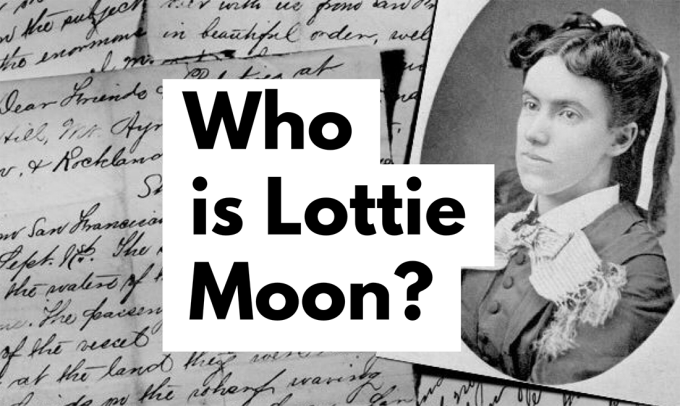
Who was Lottie Moon?
The question has come up, why has Lottie Moon become the centerpiece of the Southern Baptist’s Christmas mission offering? Each year, this same season, if you visit or attend a Southern Baptist Convention (SBC) church, you can count on hearing about the Lottie Moon Christmas Offering (LMCO). But what makes Lottie Moon so special that she became the namesake of the annual missions offering?
Several books have been written about Lottie Moon, so in an attempt to give you the condensed version I went to the International Mission Board web site and discovered lots of information about Lottie Moon.
Martin Van Buren was President of the United States when Lottie was born in Albemarle County, Virginia on December 12, 1840. Growing up in the pre-Civil War south, she was not interested in going to church, or following Jesus, but when she went off to Albemarle Female Institute, the female counterpart to the University of Virginia, she listened, and heard Jesus calling. In 1858 she dedicated her life to the Lord at the First Baptist Church, Charlottesville, Virgina. After completing college Lottie taught school in Kentucky, Georgia, and Virginia.
In 1872, Lottie’s sister, Edmonia Moon, went to Tengchow, China. The following year, Lottie was appointed to the mission field, and joined her sister there. When she set sail for China, Lottie was 32 years old. She had turned down a marriage proposal and left her job, home and family to follow God’s lead. Her path wasn’t typical for an educated woman from a wealthy Southern family. God had gripped her with the Chinese peoples’ need for a Savior.
Lottie served 39 years as a missionary, mostly in China’s Shantung province. She taught in a girls’ school and often made trips into China’s interior to share the good news with women and girls.
Initially, people feared and rejected her, but she refused to leave. The aroma of fresh-baked cookies drew people to her house. She adopted traditional Chinese dress, and she learned China’s language and customs. Lottie didn’t just serve the people of China; she identified with them. Many eventually accepted her. And some accepted her Savior.
Lottie Moon was passionate about people knowing Christ. She didn’t hesitate to speak her mind.
She died at age 72 in Japan aboard a ship returning to the United States.
In 1918 the Woman’s Missionary Union (WMU) named the annual Christmas offering for international missions after the woman who had urged them to start it.
Today’s China is a world of rapid change. It’s home to 1.4 billion individuals – one-fifth of the world’s population. Village dwellers flock to trendy megacities with exploding populations. And China holds its own in the world’s economy. It’s very different from the vast farmland Lottie Moon entered in the 1800s. But one thing hasn’t changed: China’s need for a Savior.

